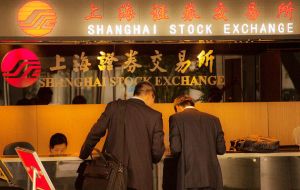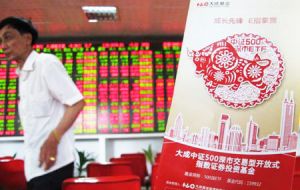MercoPress. South Atlantic News Agency
Shanghai Composite picking up strongly as fund managers buy stocks
 The Shanghai Composite was up 2.6% to 3,783.69 after the government announced measures over the weekend to stabilize the tumbling stock markets.
The Shanghai Composite was up 2.6% to 3,783.69 after the government announced measures over the weekend to stabilize the tumbling stock markets.  China Mutual Fund Association said 25 fund firms pledged to buy shares, while another 69 fund firms said they would do the same, to boost investor confidence.
China Mutual Fund Association said 25 fund firms pledged to buy shares, while another 69 fund firms said they would do the same, to boost investor confidence.  South Korea and Japan were set to meet later Monday morning to handle the impact on the markets from Greece's “no” vote, they said.
South Korea and Japan were set to meet later Monday morning to handle the impact on the markets from Greece's “no” vote, they said. Mainland Chinese shares surged nearly 8% on Monday despite the rest of Asian markets trading lower on Greece's rejection of austerity demands. The Shanghai Composite was up 2.6% to 3,783.69 after the government announced measures over the weekend to stabilize the tumbling stock markets.
In an unprecedented move, Chinese brokerages and fund managers vowed to buy massive amounts of stocks backed by the state. But, Japan's Nikkei 225 was down 1.3% to 20,281.99 on Greece's 'no' vote.
The euro fell across the board after Greek voters overwhelmingly rejected the conditions of a bailout package from its creditors in a referendum, increasing the odds of the country's exit from the euro zone. The euro was at $1.1055 in Asian trade, recovering from one-month lows it hit earlier in the day.
Investors fled to the safe haven of the yen that rallied against the dollar and euro after Greek voters rejected the bailout terms by a wider margin than expected. The euro fell 1.5% to a six-week low of 133.700 yen, but then recovered some losses to trade up to 135.41. However, it is still down from Friday's 136.185 yen.
Major commodities such as oil were also down with the price of Brent crude falling more than 1% to $59.72 in Asian trade.
Governments and central banks in South Korea and Japan were set to meet later Monday morning to handle the impact on the markets from Greece's “no” vote, they said.
”The direct economic and financial relations between Japan and Greece are limited. But government and BOJ (Bank of Japan) officials have held discussions” early this morning to ensure Japan responds smoothly to any market response as needed, Governor Haruhiko Kuroda said in a statement.
In South Korea, the benchmark Kospi index was down 0.8% to 2,088.66, while, Australia's S&P/ASX 200 index fell 1.3% to 5,468.30. Hong Kong's Hand Seng index was down 0.9% to 25,828.71 points.
On Monday, three Chinese asset managers said they would commit a combined 210m Yuan ($33.85m) of their own money to buy equity funds, as part of a concerted effort by institutional investors to stabilize the market.
Harvest Fund Management said it would spend 50m Yuan, Yinhua Fund Management would spend 90m Yuan, and the asset management arm of Orient Securities would commit 70m Yuan to buy equities.
Over the weekend, the China Mutual Fund Association said 25 fund firms pledged to buy shares, while another 69 fund firms said they would do the same, as part of emergency measures to boost investor confidence.
The Shanghai Composite has fallen nearly 30% over the last three weeks, despite an interest rate cut by the central bank the week earlier - and other measures to support the market.




Top Comments
Disclaimer & comment rules-

-

Read all commentsIt won't work in the long run. China is just about out of options. They can't save their economy.
Jul 06th, 2015 - 10:22 am 0Told ya....
It actually did not work. The composite collapsed once again. The Chinese government has done it all: cut interest rates several times, easy taxes, ease regulations, inject massive funds, to no avail. China´s economy is sick.
Jul 07th, 2015 - 02:26 am 0Commenting for this story is now closed.
If you have a Facebook account, become a fan and comment on our Facebook Page!